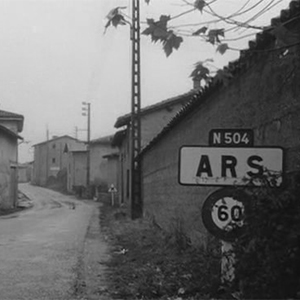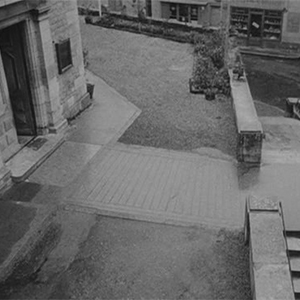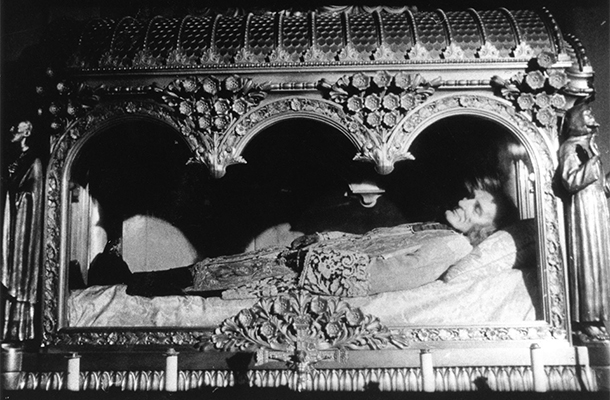
TIFF’s Bitter/Sweet The Joyous Cinema of Jacques Demy Review: Ars (1959)
Director: Jacques Demy
Country: France
Genre: Short
Editor’s Notes: The following review is part of our coverage for TIFF’s Bitter/Sweet The Joyous Cinema of Jacques Demy which runs from June 27th to July 14th at TIFF Bell Lightbox. For more information of this unprecedented film series visit http://tiff.net and follow TIFF on Twitter at @TIFF_NET.
Phantom shots take us through the wet streets of Ars as a disembodied narrator tells us the story of Jean-Mari Vianney; the complex savior of a village, harsh tyrant of strict Christian ideology, and saintly man who transformed his village and saved it from the evils of dancing and working on Sundays. In a film that uses its camera as a ghostly figure that traverses and haunts the village of Ars, Jacques Demy freezes time and space as he shows us the former haunts of Vianney; his preserved modest living quarters still stained by the blood of his self flagellation and adorned by the etchings that would inspire this villainous savior on his self-righteous path of unwanted salvation. Vianney entered the village of Ars as a humble delegate of Catholicism and pious transformer of hearts and minds, and would eventually mold the village of Ars into a model of guilt and righteousness that would make any pope proud.
In a film that uses its camera as a ghostly figure that traverses and haunts the village of Ars, Jacques Demy freezes time and space as he shows us the former haunts of Vianney; his preserved modest living quarters still stained by the blood of his self flagellation and adorned by the etchings that would inspire this villainous savior on his self-righteous path of unwanted salvation.
 Demy’s phantom camera moves through the quiet village streets of Ars, sneaking like the disembodied spirit of Vianney to survey the impact of his mortification and the unwavering piety of his sermons. This phantasmal camera moves through buildings and streets with unhampered ease, finding peace in Vianney’s humble quarters and satisfaction from the humbled faces of the parishioners that still attend the church where he first preached his unpopular message of unconditional piety. Demy’s camera is evocative of Alain Renais as he finds unpleasant memories that stain the walls with the unwashable blood of self mortification as spaces contain memories and men can bend the memories of those spaces through sheer force of will in varying degrees of unpleasantness. The tainted spaces of Resnais’ Night and Fog were forever putrefied by the monstrosities of genocide, but the walls of Ars were no less tarnished by one man’s idea of what it is to be pure of spirit.
Demy’s phantom camera moves through the quiet village streets of Ars, sneaking like the disembodied spirit of Vianney to survey the impact of his mortification and the unwavering piety of his sermons. This phantasmal camera moves through buildings and streets with unhampered ease, finding peace in Vianney’s humble quarters and satisfaction from the humbled faces of the parishioners that still attend the church where he first preached his unpopular message of unconditional piety. Demy’s camera is evocative of Alain Renais as he finds unpleasant memories that stain the walls with the unwashable blood of self mortification as spaces contain memories and men can bend the memories of those spaces through sheer force of will in varying degrees of unpleasantness. The tainted spaces of Resnais’ Night and Fog were forever putrefied by the monstrosities of genocide, but the walls of Ars were no less tarnished by one man’s idea of what it is to be pure of spirit.
The narrator grants the only context to most of the imagery in Ars as the camera glides through alleyways and spaces once tread upon by Vianney and as we are candidly told of the significance of these spaces Demy playfully cuts to the evils of dancing and burlesque clubs and entices the devil in flashes of debauchery and ungodliness, suggesting more than a little cynicism concerning the righteousness of Vianney’s sermons and beliefs.
 We learn of the trials and tribulations faced by Vianney on his mission to purify Ars, but despite the innuendo, slander, and initial resistance to the tenets of Catholicism he ultimately managed to save the town from its own unrighteousness. The narrator grants the only context to most of the imagery in Ars as the camera glides through alleyways and spaces once tread upon by Vianney and as we are candidly told of the significance of these spaces Demy playfully cuts to the evils of dancing and burlesque clubs and entices the devil in flashes of debauchery and ungodliness, suggesting more than a little cynicism concerning the righteousness of Vianney’s sermons and beliefs.
We learn of the trials and tribulations faced by Vianney on his mission to purify Ars, but despite the innuendo, slander, and initial resistance to the tenets of Catholicism he ultimately managed to save the town from its own unrighteousness. The narrator grants the only context to most of the imagery in Ars as the camera glides through alleyways and spaces once tread upon by Vianney and as we are candidly told of the significance of these spaces Demy playfully cuts to the evils of dancing and burlesque clubs and entices the devil in flashes of debauchery and ungodliness, suggesting more than a little cynicism concerning the righteousness of Vianney’s sermons and beliefs.
Like many early short films from cinema’s greatest filmmakers, Ars shows the spark of its maker and the thoughtful consideration put into each image, however innocuous that imagery may seem. Demy allows us to see the world through the eyes of the dead as Vianney surveys the product of his teaching and impact of his sermons from beneath the wax mask that covers his skull, grinning away eternity as the rest of his entombed body purportedly sits uncorrupted by decomposition.
Related Posts
![]()
Matthew Blevins
![]()
Latest posts by Matthew Blevins (see all)

































